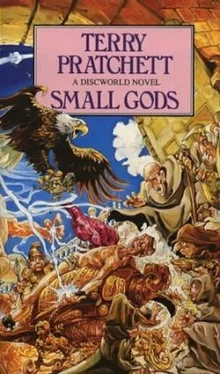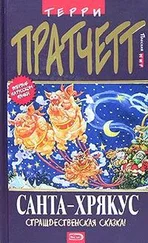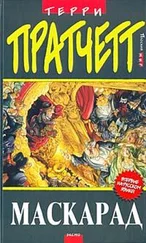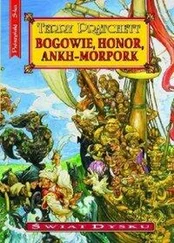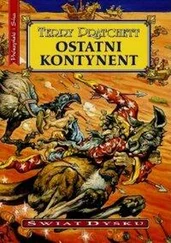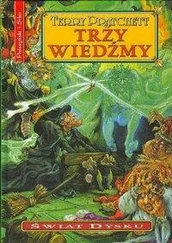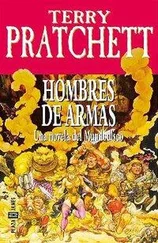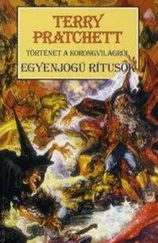Terry Pratchett - Small Gods
Здесь есть возможность читать онлайн «Terry Pratchett - Small Gods» весь текст электронной книги совершенно бесплатно (целиком полную версию без сокращений). В некоторых случаях можно слушать аудио, скачать через торрент в формате fb2 и присутствует краткое содержание. Жанр: Юмористическая фантастика, на английском языке. Описание произведения, (предисловие) а так же отзывы посетителей доступны на портале библиотеки ЛибКат.
- Название:Small Gods
- Автор:
- Жанр:
- Год:неизвестен
- ISBN:нет данных
- Рейтинг книги:4 / 5. Голосов: 1
-
Избранное:Добавить в избранное
- Отзывы:
-
Ваша оценка:
- 80
- 1
- 2
- 3
- 4
- 5
Small Gods: краткое содержание, описание и аннотация
Предлагаем к чтению аннотацию, описание, краткое содержание или предисловие (зависит от того, что написал сам автор книги «Small Gods»). Если вы не нашли необходимую информацию о книге — напишите в комментариях, мы постараемся отыскать её.
Small Gods — читать онлайн бесплатно полную книгу (весь текст) целиком
Ниже представлен текст книги, разбитый по страницам. Система сохранения места последней прочитанной страницы, позволяет с удобством читать онлайн бесплатно книгу «Small Gods», без необходимости каждый раз заново искать на чём Вы остановились. Поставьте закладку, и сможете в любой момент перейти на страницу, на которой закончили чтение.
Интервал:
Закладка:
"No," he said, "maybe you didn't. But it doesn't matter. Listen to me, my innocent little priest. Sometimes there has to be a war. Things go too far for words. There's . . . other forces. Now . . . go back to your people. Maybe we'll both be alive when all this is over and then we can talk. Fight first, talk after. That's how it works, boy. That's history. Now, go back."
Brutha turned away.
I. Shall I Smite Them?
"No!"
Il. I Could Make Them As Dust. Just Say The Word.
"No. That's worse than war."
III. But You Said A God Must Protect His People
"What would we be if I told you to crush honest men?"
IV. Not Stuck Full Of Arrows?
No.
The Omnians were assembling among the dunes. A lot of them had clustered around the iron-shielded cart. Brutha looked at it through a mist of despair.
"Didn't I say I'd go down there alone?" he said.
Simony, who was leaning against the Turtle, gave him a grim smile.
"Did it work?" he said.
"I think . . . it didn't."
"I knew it. Sorry you had to find out. Things have a way of wanting to happen, see? Sometimes you get people facing off and . . . that's it."
"But if only people would-”
"Yeah. You could use that as a commandment."
There was a clanging noise, and a hatch opened on the side of the Turtle. Urn emerged, backward, holding a spanner.
"What is this thing?" said Brutha.
"It's a machine for fighting," said Simony. "The Turtle Moves, eh?"
"For fighting Ephebians?" said Brutha.
Urn turned around.
"What?" he said.
"You've built this . . . this thing . . . to fight Ephebians?"
"Well . . . no . . . no," said Urn, looking bewildered. "We're fighting Ephebians?"
"Everyone," said Simony.
"But I never . . . I'm an . . . I never-”
Brutha looked at the spiked wheels and the sawedged plates around the edge of the Turtle.
"It's a device that goes by itself," said Urn. "We were going to use it for . . . I mean . . . look, I never wanted it to . . .'
"We need it now," said Simony.
"Which we?"
"What comes out of the big long spout thing at the front?" said Brutha.
"Steam," said Urn dully. "It's connected to the safety valve."
"Oh."
"It comes out very hot," said Urn, sagging even more.
"Oh?"
"Scalding, in fact."
Brutha's gaze drifted from the steam funnel to the rotating knives.
"Very philosophical," he said.
"We were going to use it against Vorbis," said Urn.
"And now you're not. It's going to be used against Ephebians. You know, I used to think I was stupid, and then I met philosophers."
Simony broke the silence by patting Brutha on the shoulder.
"It will all work out," he said. "We won't lose. After all," he smiled encouragingly, "we have God on our side."
Brutha turned. His fist shot out. It wasn't a scientific blow, but it was hard enough to spin Simony around. He clutched his chin.
"What was that for? Isn't this what you wanted?"
"We get the gods we deserve," said Brutha, "and I think we don't deserve any. Stupid. Stupid. The sanest man I've met this year lives up a pole in the desert. Stupid. I think I ought to join him."
I. Why?
"Gods and men, men and gods," said Brutha. "Everything happens because things have happened before. Stupid."
II. But You Are The Chosen One.
"Choose someone else."
Brutha strode off through the ragged army. No one tried to stop him. He reached the path that led up to the cliffs, and did not even turn to look at the battlelines.
"Aren't you going to watch the battle? I need someone to watch the battle."
Didactylos was sitting on a rock, his hands folded on his stick.
"Oh, hello," said Brutha, bitterly. "Welcome to Omnia."
"It helps if you're philosophical about it," said Didactylos.
"But there's no reason to fight!"
"Yes there is. Honor and revenge and duty and things like that."
"Do you really think so? I thought philosophers were supposed to be logical?"
Didactylos shrugged.
"Well, the way I see it, logic is only a way of being ignorant by numbers."
"I thought it would all be over when Vorbis was dead."
Didactylos stared into his inner world.
"It takes a long time for people like Vorbis to die. They leave echoes in history."
"I know what you mean."
"How's Urn's steam machine?" said Didactylos.
"I think he's a bit upset about it," said Brutha.
Didactylos cackled and banged his stick on the ground.
"Hah! He's learning! Everything works both ways!"
"It should do," said Brutha.
Something like a golden comet sped across the sky of the Discworld. Om soared like an eagle, buoyed up by the freshness, by the strength of the belief. For as long as it lasted, anyway. Belief this hot, this desperate, never lasted long. Human minds could not sustain it. But while it did last, he was strong.
The central spire of Cori Celesti rises up from the mountains at the Hub, ten vertical miles of green ice and snow, topped by the turrets and domes of Dunmanifestin.
There the gods of the Discworld live.
At the least, any god who is anybody. And it is strange that, although it takes years of effort and work and scheming for a god to get there, once there they never seem to do a lot apart from drink too much and indulge in a little mild corruption. Many systems of government follow the same broad lines.
They play games. They tend to be very simple games, because gods are easily bored by complicated things. It is strange that, while small gods can have one aim in mind for millions of years, are in fact one aim, large gods seem to have the attention span of the common mosquito.
And style? If the gods of the Discworld were people they would think that three plaster ducks is a bit avant-garde.
There was a double door at the end of the main hall.
It rocked to a thunderous knocking.
The gods looked up vaguely from their various preoccupations, shrugged and turned away.
The doors burst inward.
Om strode through the debris, looking around with the air of one who has a search to complete and not a lot of time to do it in.
"Right," he said.
Io, God of Thunder, looked up from his throne and waved his hammer threateningly.
"Who are you?"
Om strode toward the throne, picked up to by his toga, and gave a quick jab with his forehead.
Hardly anyone really believes in thunder gods any more . . .
Ow.
"Listen, friend. I've got no time for talking to some pantywaister in a sheet. Where's the gods of Ephebe and Tsort?"
lo, clutching at his nose, waved vaguely towards the center of the hall.
"You nidn't naf to ndo dat!" he said reproachfully.
Om strode across the hall.
In the center of the room was what at first looked like a round table, and then looked like a model of the Discworld, Turtle, elephants and all, and then in some undefinable way looked like the real Discworld, seen from far off yet brought up close to. There was something subtly wrong about the distances, a feeling of vast space curled up small. But possibly the real Discworld wasn't covered with a network of glowing lines, hovering just above the surface. Or perhaps miles above the surface?
Om hadn't seen this before, but he knew what it was. Both a wave and a particle; both a map and the place mapped. If he focused on the tiny glittering dome on top of the tiny Cori Celesti, he would undoubtedly see himself, looking down on an even smaller model . . . and so on, down to the point where the universe coiled up like the tail of an ammonite, a kind of creature that lived millions of years ago and never believed in any gods at all . . .
The gods clustered around it, watching intently.
Om elbowed aside a minor Goddess of Plenty.
There were dice floating just above the world, and a mess of little clay figures and gaming counters. You didn't need to be even slightly omnipotent to know what was going on.
Читать дальшеИнтервал:
Закладка:
Похожие книги на «Small Gods»
Представляем Вашему вниманию похожие книги на «Small Gods» списком для выбора. Мы отобрали схожую по названию и смыслу литературу в надежде предоставить читателям больше вариантов отыскать новые, интересные, ещё непрочитанные произведения.
Обсуждение, отзывы о книге «Small Gods» и просто собственные мнения читателей. Оставьте ваши комментарии, напишите, что Вы думаете о произведении, его смысле или главных героях. Укажите что конкретно понравилось, а что нет, и почему Вы так считаете.
